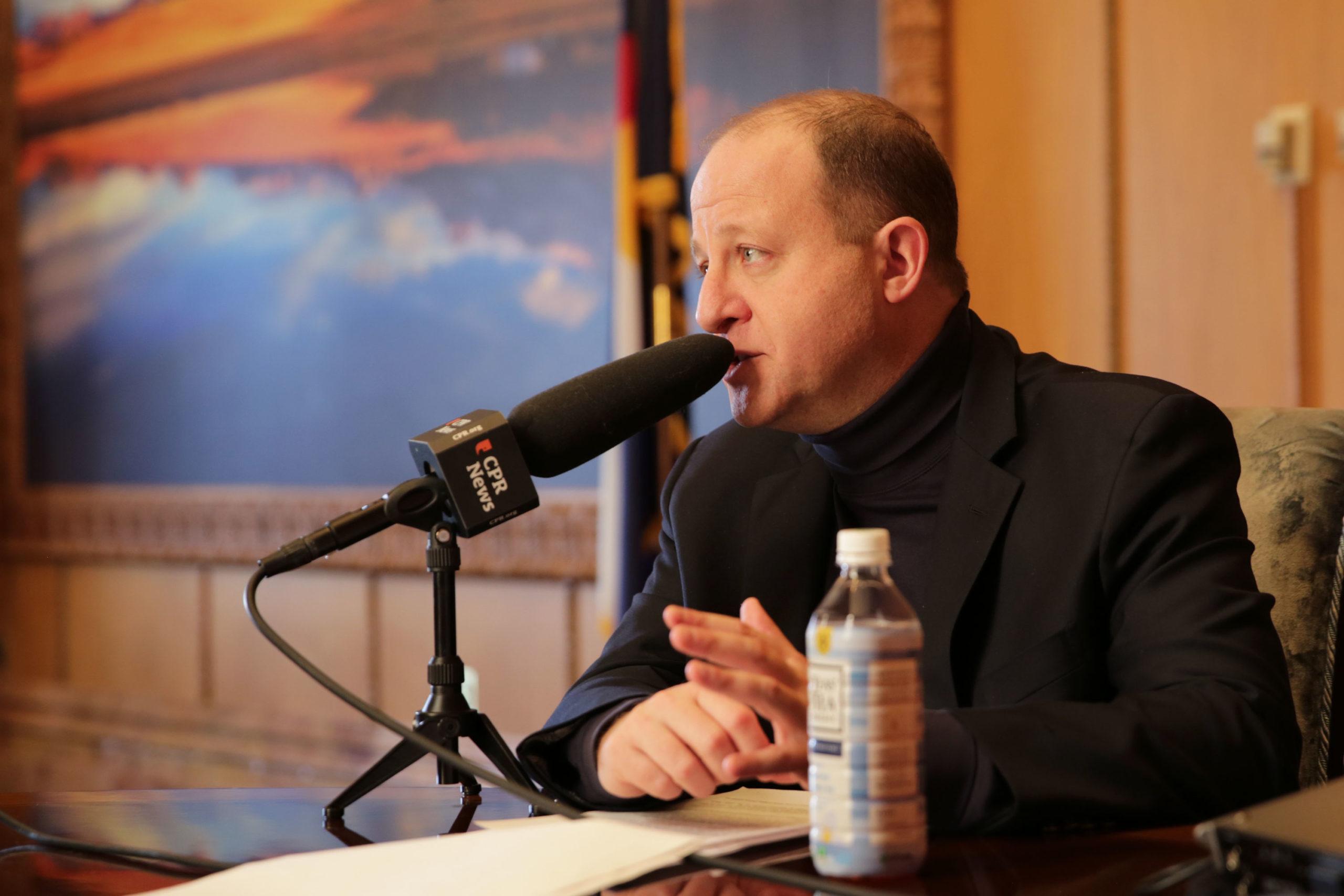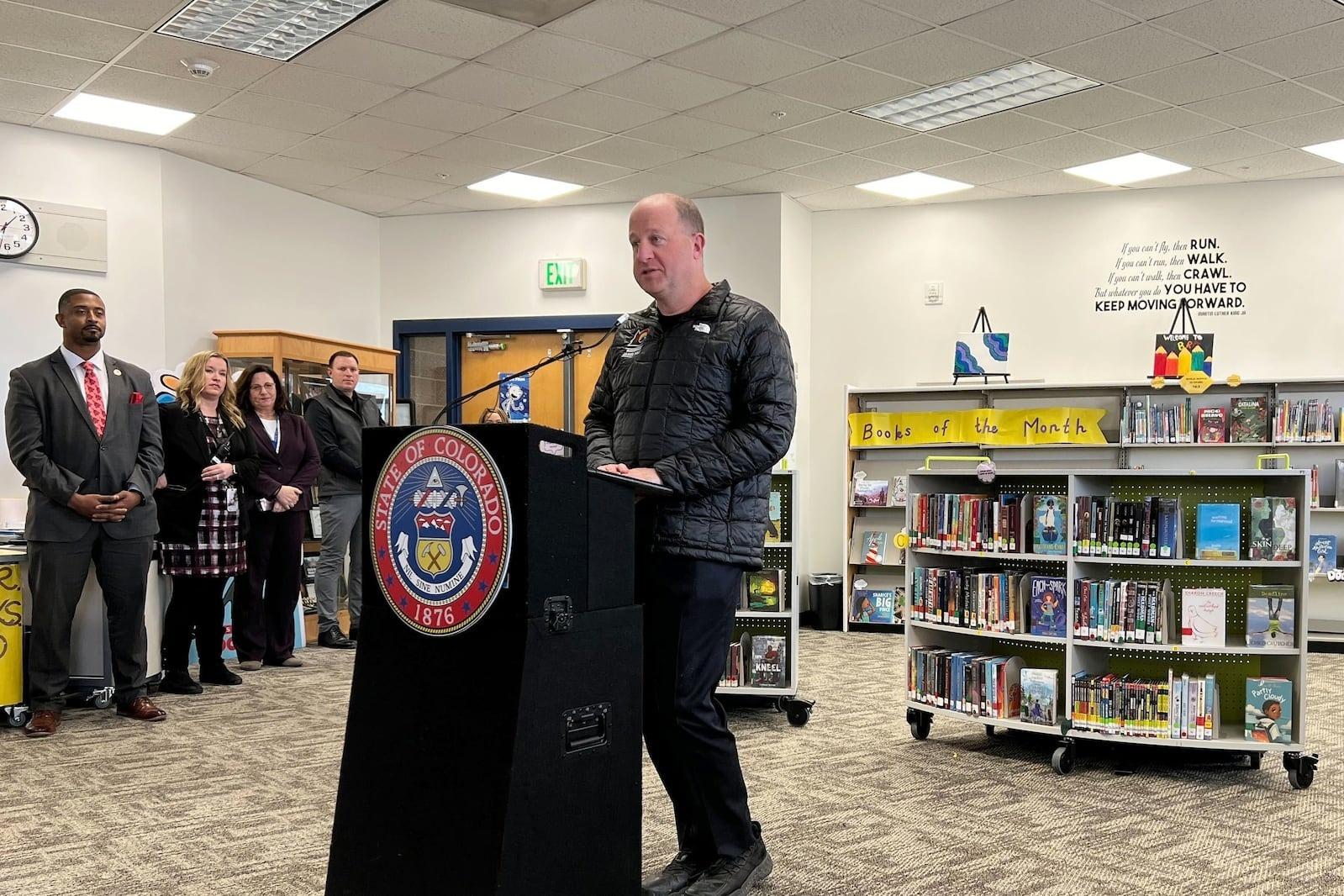
State and local officials are prepared to handle a coronavirus outbreak in Colorado, Gov. Jared Polis said Thursday.
Shortly after he took office in 2019, Polis and his administration practiced their response to an epidemic, he told Colorado Matters.
An outbreak of norovirus in the Grand Junction area last fall also holds some parallels to how state and local officials might respond if coronavirus becomes widespread, Polis said.
Local governments, including cities, counties and school districts take the lead when an epidemic occurs, working in close consultation with the state, he said.
“Our administration is ready and we work closely with counties and with school districts to prevent an outbreak that would risk the lives of Coloradans," Polis said.
The governor also spoke to Colorado Matters about his plans to sign a death penalty repeal recently approved by lawmakers and about the prospect of clemency for three men already on death row.
Interview Highlights
On a 2019 norovirus outbreak in Grand Junction, and how it might presage the state’s response to coronavirus:
"What Mesa County schools did, and luckily this was just before I believe it was Thanksgiving break, they closed down their schools for a period of time and then did a thorough cleaning of their schools … and I went there and I met with them and of course they coordinated with the Colorado Department of Public Health and Environment. The decision to close down the schools was the superintendent's. But every step of the way the state was working with them and advising them on the threat."
On a drill he participated in to gameplan response to an epidemic:
"We looked at what happens and walked through a contagion situation where we had a patient, a fake patient of course. They were plastic just to be clear … a plastic patient transported from DIA, kept in isolation. I was there and got to participate in that. So our administration is ready and we work closely with counties and with school districts to prevent an outbreak that would risk the lives of Coloradans."
On a flaw in Colorado’s death penalty law. Lawmakers have approved a repeal of the death penalty and Polis says he’ll sign the bill:
"The drugs that are prescribed in law as the method of execution are not commercially available to Colorado. It leaves open the possibility of other means, but doesn't specify what those means are. The legislature needs to either fix the death penalty so that we can execute people or end the death penalty. They've chosen to end it. Either one of those works. But this limbo that we were in was not a good solution for Colorado."
On the death penalty being unevenly applied:
"The Aurora theater shooting — so this guy killed 12 people and he didn't get (the death penalty) and yet somebody that killed two people does get it. And that sort of caused me to wonder, well, why would somebody who killed 12 people not get it? But you kill two people and you get it. That doesn't seem right. So in the name of equal justice, I think it's important that we end this anachronistic method of punishment."
Interview Transcript
Ryan Warner: This is Colorado Matters from CPR News. I'm Ryan Warner.
When it comes to coronavirus, what kind of response might we expect from the state? We asked Governor Jared Polis in our regular conversation at the Capitol. He draws parallels to the outbreak of a different virus in Grand Junction late last year.
Gov. Jared Polis: Hundreds, I think even thousands of teenagers and their parents, because it affected their families, it was based in the schools, got a very dramatic illness, meaning they were throwing up, they were quite ill. It was a short 24 to 48-hour deal but very dramatic symptoms. And hundreds or thousands of people came down with that.
So what Mesa County schools did, and luckily this was just before I believe it was Thanksgiving break, they closed down their schools for a period of time and then did a thorough cleaning of their schools. So our county health — and I went there and I met with them and, of course, they coordinated with Colorado Department of Public Health and Environment. The decision to close down the schools was the superintendent's. But every step of the way the state was working with them and advising them on the threat.
RW: So in that way, the locals acted with leadership from the state. Is that the model applied to coronavirus? And if it got more serious would your powers kick in?
JP: Yeah. We have really, I guess what you might call distributed government in Colorado, meaning municipalities, there's I think over 70 home rule cities; there's counties; there's school districts. They're not formally under the governor, nor should they be. I mean your school district is under your elected school board. But again, school districts are attentive to public health. They work with county health departments, which are a political unit of the state government, and of course our Colorado Department of Public Health. We also have an emergency response division that's statewide. This is really the same thing that kicks in when we have a fire, flood, when we have any threat of an epidemic.
I went through a drill in my first couple of months where we looked at what happens and walked through a contagion situation where we had a patient, a fake patient of course. They were plastic just to be clear … a plastic patient transported from DIA, kept in isolation. I was there and got to participate in that. So our administration is ready and we work closely with counties and with school districts to prevent an outbreak that would risk the lives of Coloradans.
RW: I want to switch topics to talk about the legislature voting to repeal Colorado's death penalty. You've said that you will sign that bill. I'll note here that the repeal isn't retroactive so it wouldn't apply to the three men now on death row. But last year you told us if there was a repeal you would probably commute those sentences.
(Polis’ statement in a Feb. 7, 2019 interview): If the state Republicans and Democrats were to say, and I were to sign a bill that said, we no longer have the death penalty in Colorado, whether it's formally in the bill or not, I would certainly take that as a strong indication that those who are currently on death row should have their sentences commuted to life in prison.
RW: Now this week in an interview with the Colorado Sun, you seemed a little less definitive. The Sun reported that you said, quoting here, ‘All clemency requests are obviously a very weighty decision. We'll judge them on the individual merits.’ What changed?
JP: Yeah, well both of those are true. I think clearly the declaration by the legislature that there is no more death penalty that Coloradans can be sentenced to is a statement. And of course it's also true that in any clemency case you need to do it on a case-by-case basis. That, of course, includes any of the people that are on death row.
RW: So you've been in office for a bit now and you certainly are aware of the cases that Colorado has folks on death row. Is there a case that you are ready to make a decision on?
JP: Well, they've not, as far as I know, applied for clemency. Part of the issue in Colorado is that there's not any way to carry out a death penalty that a jury sentences somebody to, so it's sort of a theoretical penalty. The last one was I believe in the late (19)90s.
RW: What do you mean by that?
JP: The drugs that are prescribed in law as the method of execution are not commercially available to Colorado. It leaves open the possibility of other means, but doesn't specify what those means are. The legislature needs to either fix the death penalty so that we can execute people or end the death penalty. They've chosen to end it. Either one of those works. But this limbo that we were in was not a good solution for Colorado.
RW: So do you take it as any kind of mandate that when Colorado with your signature repeals the death penalty, the three people on death row are a little closer to life in prison in your mind ethically?
JP: Well, again, absent the legislature fixing the death penalty, it's very unlikely that those sentences would be able to be carried out. There's no legal means to carry out the death penalty in Colorado right now.
RW: So you're saying it's almost a defacto life in prison?
JP: You know, I guess it's a question of whether the sword of Damocles hovering over their heads is an additional punishment that a jury assigned because, you know, they know that they have that uncertainty. But yes, it's a very small amount of uncertainty because the state hasn't carried this out in a quarter-century and doesn't currently have a way of doing so.
RW: The legislature's debate was probably more intense because two lawmakers, Tom Sullivan and Rhonda Fields each lost a son to murder. Both Representative Sullivan and state Senator Fields opposed repeal. Here's Rhonda Fields speaking to CPR before the Senate vote.
Rhonda Fields: It's personal. The three people that are on death row, two of them are there for murdering my son. And they've been found guilty not once but twice because there is a death penalty phase. So 12 citizen jurors came together and they all came back with a unanimous vote that they're guilty.
RW: So the men convicted of killing Sen. Fields' son and his fiance are on death row so they could potentially receive clemency. Knowing Sen. Fields personally, working with her frequently, how do you talk to her about this and did she ever make you question your stand?
JP: So, when you look at the families and you listen to families of the victims, and Sen. Fields and Tom Sullivan are sadly not unique in this regard, you know, there's a diversity of opinion. Some feel the perpetrator of the crime against their loved one should rot in prison for the rest of their lives. Others feel that they should have their life taken.
But you know, the Aurora theater shooting — so this guy killed 12 people and he didn't get it and yet somebody that killed two people does get it. And that sort of caused me to wonder, well, why would somebody who killed 12 people not get it? But you kill two people and you get it. That doesn't seem right. So in the name of equal justice, I think it's important that we end this anachronistic method of punishment, which is going anyway at some point. It's on the way out. Let's embrace the future and join the nations of the world and many of the states that have already abolished the death penalty.









